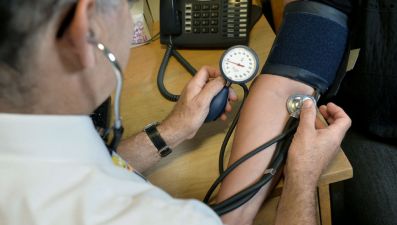The shortage of GPs in Ireland is causing people to use out-of-hours urgent medical services as a “surrogate GP” service, according to a Kildare-based doctor.
Dr Brendan O’Shea, Assistant Adjuvant Professor in the Department of Public Health (Primary Care) at Trinity College Dublin, believes this practice is not suitable in the long-term as it leads to a lack of continuity of care.
“GP cooperatives were set up for the provision of short-term episodic care for medical issues that are too urgent for a patient to wait for their own doctor to see them.
“That’s what they are designed to do – they are neither resourced nor designed to replace what’s done in general practice,” Dr O’Shea explains.
A member of the KDOC GP cooperative which operates in Nass and Celbridge, he estimates somewhere between 5-15 per cent of people accessing such services are using them in place of a regular GP, impacting their long-term standard of care.
“The risk of significant interaction of prescribing errors are much higher if they are being seen by doctors who don’t have an opportunity to know them.
“We know that on an actuarial basis, for example, that a small portion of consultations around depression will go wrong and that increases the likelihood of things like suicide.”
Dr O’Shea points out there are a number of medical issues where continuity of care is particularly important, including hypertension, diabetes, chronic pain, and other mental health issues such as anxiety.
'Hugely inadequate'
Compared to other countries, the capacity in Irish general practice is “hugely inadequate” which is having “huge knock-on effects”.
“There aren’t enough GPs,” Dr O’Shea says, with figures from the ICGP showing Ireland has 30 per cent fewer GPs per head of population than the UK.
“If you don’t have this capacity in general practice, care spills over into the wrong places, including the GP cooperatives and the casualty departments.
“Our colleagues in casualty say they need more beds, we need bigger hospitals, we need bigger casualty departments, but if you have a steady stream of people going into casualty departments who ought to be cared for in general practice, you actually need more GPs.”
Ultimately, to address the current GP shortage, Ireland must train, recruit and retain more GPs, which the ICGP is working towards by increasing the number of trainees on the national training scheme, however, Dr O’Shea adds we must also ensure funding for primary care is being used effectively.
“We are actually putting quite a large chunk of funding into the public health system, but we really have to question how the money is being spent.

“In Ireland, we estimate that only 4 per cent of the health budget goes into general practice/primary care - in most of Europe and the NHS (UK), it’s between 8-11 per cent,” he says.
In the short-term, for people who cannot access general practice services because GPs in their area have reached capacity and are no longer taking new patients, Dr O’Shea says, while not always ideal, “nobody will be turned away” from urgent out-of-hours medical services.
With more GPs being trained, which should lead to more GPs in the community, he advises those looking for a general practitioner to stay in the loop on social media and in community groups so they can register with any new doctors who come to their area.
While not an immediate fix, Dr O’Shea also stresses the importance of raising the issue with local elected officials. “Ask them what are they doing about it,” he says. “The more of those letters that hit home, the more likely it is that the politicians will begin to ask more serious and focused questions of the Department of Health and the HSE.”







